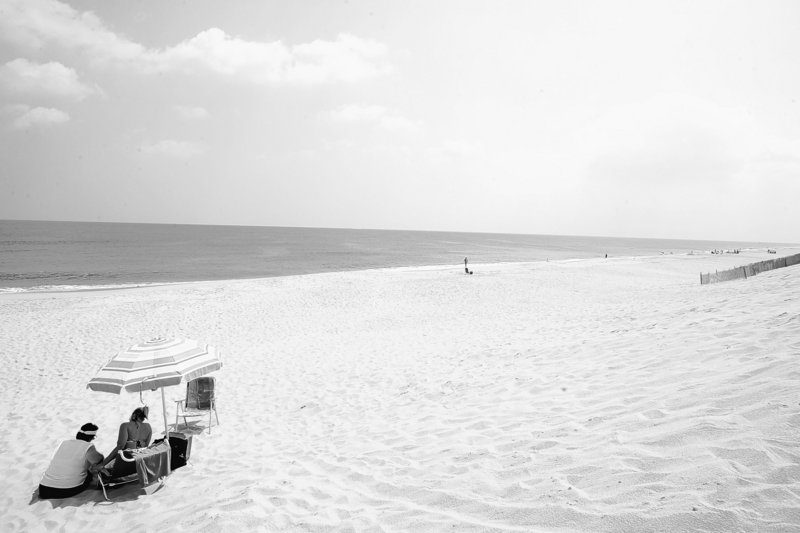MANTOLOKING, N.J. – Some Jersey shore beach towns have plenty of ways to keep outsiders off their sand: Limit on-street parking, prohibit food and drink, and have no public bathrooms.
One town literally walls off the public from much of the ocean with a protective stone seawall and offers virtually no parking.
Beach access has led to a drawn-out court battle in many coastal states. And now in New Jersey, the state Department of Environmental Protection is bowing to complaints from some local governments and private property owners that state access rules are too strict.
The department is letting each shore town decide for itself what level of public access is appropriate, though the state will still have to sign off on each plan. The new policy has some beach advocates fearing communities will become even more restrictive.
“This sets us back 15 years,” said Ralph Coscia, who co-founded Citizens Right to Access Beaches after the beloved Point Pleasant Beach was bulldozed to make way for oceanfront luxury homes in the 1990s.
The department says its goal is to maintain public access while applying common sense to beach access rules and letting towns and property owners take local conditions into account.
“We believe the Jersey shore and the coastline should be open to everyone,” said department spokesman Larry Ragonese. “But there can’t be carte blanche to go anywhere, on anyone’s property you want.”
Under the Public Trust Doctrine, a legal concept that dates to the Roman Emperor Justinian, the public has the right to swim in coastal waters and walk along their shores. Courts have held that the public has the right to walk or sit on the sand up to the mean high-water mark — even on beaches where most of the sand is privately owned.
But many oceanfront home-owners either don’t know or don’t care, and they routinely call the police when someone sets up a beach chair or a towel too close for their liking.
Battles over who rules the sand are being fought all over the country. It’s not just about unbroken ocean views, either. In New Jersey, tourism is a nearly $40 billion industry, and its beaches are a primary draw.
The U.S. Supreme Court last week ruled that Florida can undertake beach-widening projects without compensating beach-front property owners who lose exclusive access to the water.
California fought for years to mediate public demands for access to prime beaches when wealthy homeowners tried to block them. The city of Dana Point disagrees with the state on who should control beach access through a gated community of multimillion-dollar homes.
In North Carolina, state officials are trying to balance competing demands over the use of a popular Outer Banks beach: Fishermen and outdoor enthusiasts want to drive on the sand, and environmentalists want to protect coastal wildlife.
Under the previous administration of Gov. Jon Corzine, New Jersey required public access points every quarter-mile and bathrooms every half-mile on any beach that received public money for beach replenishment.
But an appeals court overturned those rules in 2008, deciding that the state had no right to order towns to allow 24-hour access to their beaches or to require bathrooms there.
Robert Dinerman, 73, of Cincinnati owns a summer house in Bay Head, N.J. — a town that legally restricted its beaches to residents only, until a 1984 court decision said public beaches must be open to anyone. Bay Head offers no public restrooms and bans food from the beach.
In neighboring Mantoloking, police zealously enforce a two-hour parking limit on most streets so beach-goers can’t park in one spot for two hours, then move their car. This makes it impractical for anyone but residents to use the beaches, some of which charge hundreds of dollars for a seasonal badge.
“All these towns have their little idiosyncrasies to try to keep people off the beach,” Dinerman said. “I have no objection to making it more public.”
The DEP says that when it considers what to approve under the new rules, it will look at arrangements like Bay Head’s ban on toilets and food, Mantoloking’s lack of an affordable daily badge, and miles of inaccessible beaches on Long Beach Island blocked off by private homes.
Send questions/comments to the editors.



Success. Please wait for the page to reload. If the page does not reload within 5 seconds, please refresh the page.
Enter your email and password to access comments.
Hi, to comment on stories you must . This profile is in addition to your subscription and website login.
Already have a commenting profile? .
Invalid username/password.
Please check your email to confirm and complete your registration.
Only subscribers are eligible to post comments. Please subscribe or login first for digital access. Here’s why.
Use the form below to reset your password. When you've submitted your account email, we will send an email with a reset code.